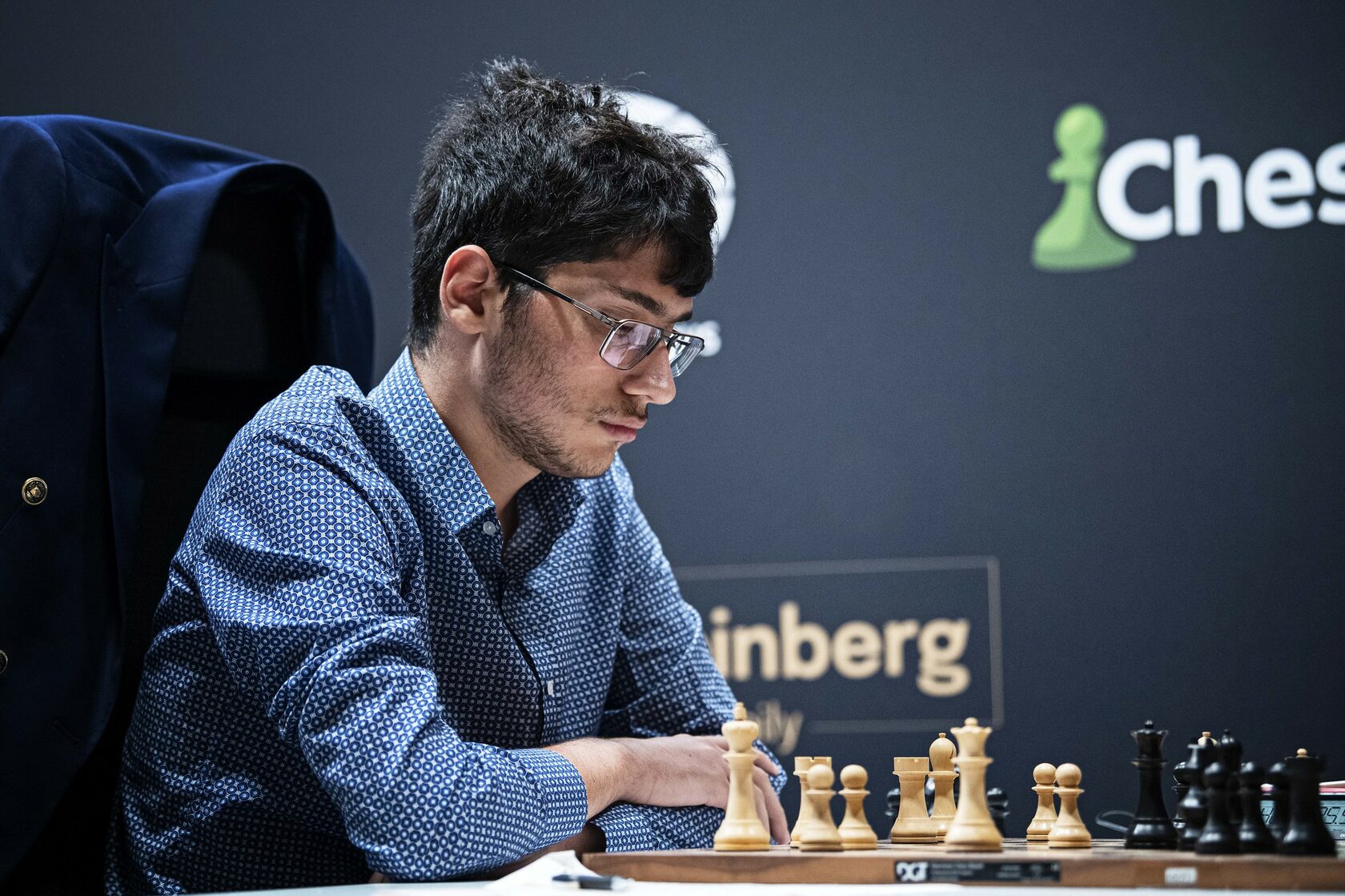Ian Nepomniachtchi remains in the lead on 6.5/9, a full point ahead of Fabiano Caruana. A step behind, on 4.5, is Hikaru Nakamura joined by Ding Liren who gradually made progress and has now scored his first win having had a very poor start to the tournament. Following their first victories in the tournament, Teimour Radjabov and Alireza Firouzja are on four points, where they join Richard Rapport who lost today. On three points out of nine, Jan-Krzysztof Duda is alone on the bottom of the board.
It was a day of big upsets and decisive outcomes in Madrid as three out of four games ended with a victory, while there was just one draw.
The derby of the round was between Fabiano Caruana who had to win against tournament leader Ian Nepomniachtchi if he wanted to equalise for first place. The two drew their first game, in round two. Following a difficult day in round eight where he lost after seven hours of play, Caruana had a challenging task as White in today’s game. The American came out with excellent home preparation in the Petrov and got an edge straight out of the opening. However, Nepomniachtchi managed to overcome the complications, showing resourcefulness in defence and equalising with a sequence of only moves as Caruana lacked precision in keeping things tense. A draw was obviously a satisfactory result for the leader of the event and somewhat a disappointment for Caruana.
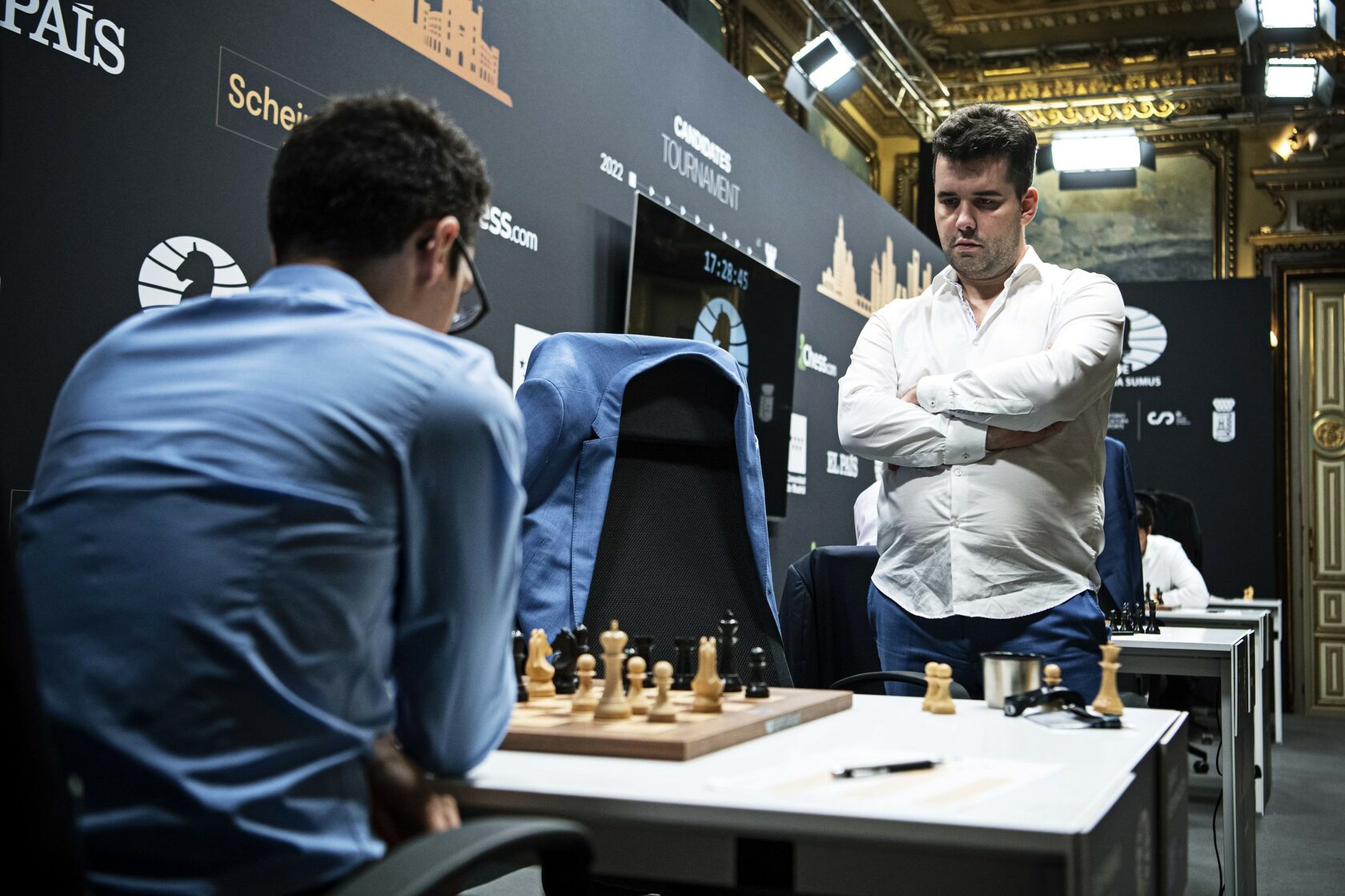
This game was a direct duel for first place. With this draw, Nepomniachtchi secured that he enters the remaining stage of the tournament with a full point ahead of his runner-up Caruana, his most serious contender for winning the Candidates.
The events of the day also played into Nepomniachtchi’s hand as the only two other players who stood reasonable chances of making their way to the top – Hikaru Nakamura and Richard Rapport – lost their games. With a day of rest ahead, Nepomniachtchi is in a very comfortable position.
Richard Rapport lost as Black to Alireza Firouzja in what is the first win for the youngest player of the event. In the Berlin defence, White captured the initiative early on. While Firouzja didn’t play in the most precise way and even allowed Black chances to turn the tables, in the critical moment of the game Rapport made an error after which he could no longer recover. With a weak pawn structure, exposed king in the centre and undeveloped rook on h8, Rapport stood no chance to defend from Firouzja’s attack and he resigned after 41 moves.
Rapport is again back in the red, while Firouzja has finally broken the spell and scored his first victory in his first Candidates ever. The 19-year-old’s biggest challenge is fighting his own nerves. With this victory, Firouzja has shown that he has the strength to pull through difficult times. This will hopefully help boost his confidence and stability.
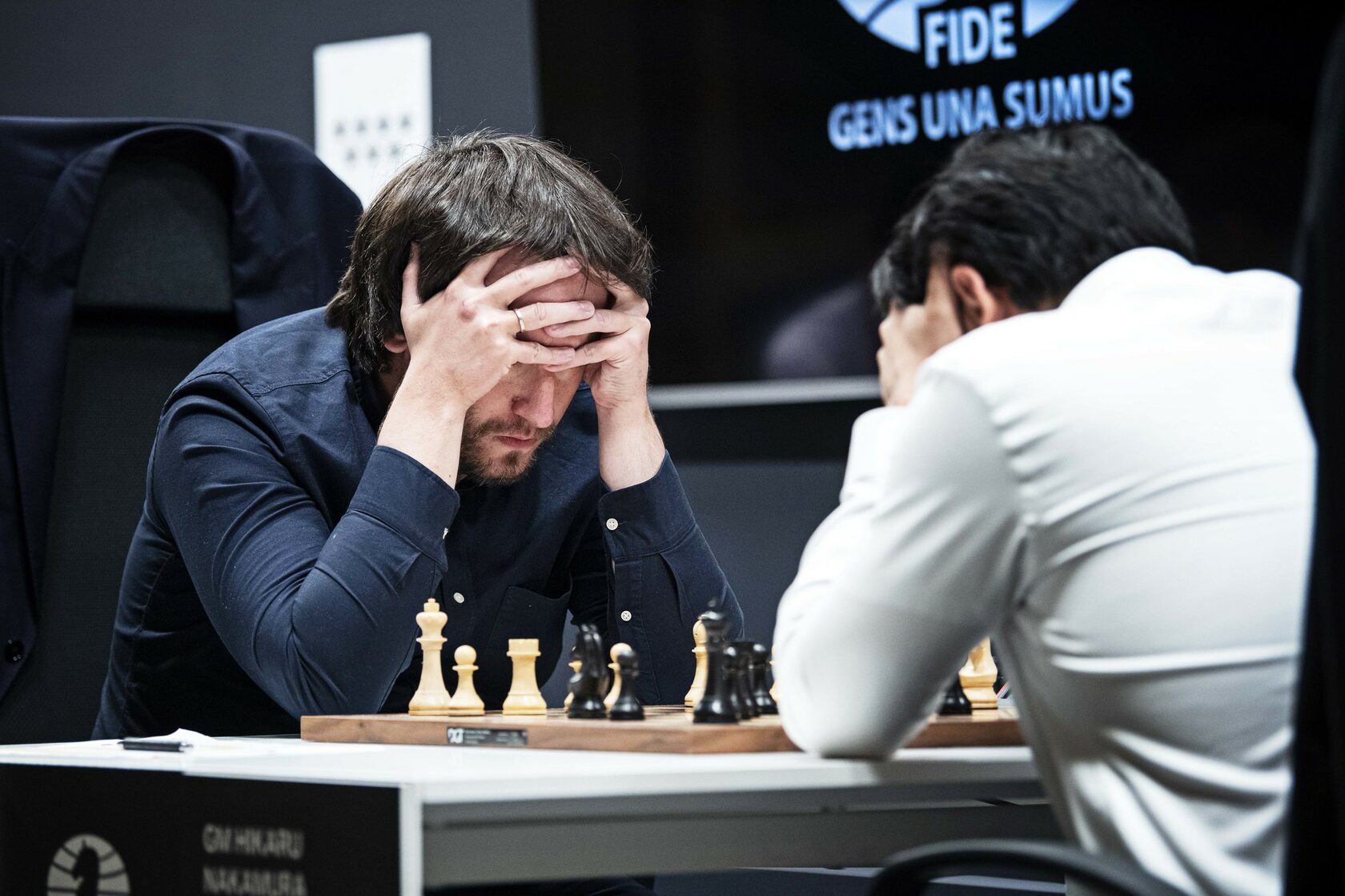
Teimour Radjabov also has reasons to celebrate as he scored not only his first victory in this tournament but the first win since 2019. Playing with white pieces he surprised Hikaru Nakamura in the Berlin and gained initiative early in the game. Nakamura offered a repetition of moves twice, but Radjabov refused. This was already an early sign of things to come. The position transpired to an endgame where White had two unopposed runners on the queenside. Nakamura tried to create some complications but without any success.
Radjabov’s last victory was on 2nd October 2019, in the World Cup against Ding Liren. Today’s success is a great boost for his self-confidence and, hopefully, an opener for his creativity and innate dynamism which, blended with his newfound solidity, make him an extremely difficult opponent to face, regardless of where he is on the scoreboard.
With this defeat, Nakamura is back to 50 percent, a point behind Caruana and two points behind Nepomniachtchi. Had the game gone a different way and black ended up winning, Nakamura would be sharing second place. It will be interesting to see how and if Nakamura recovers from this.
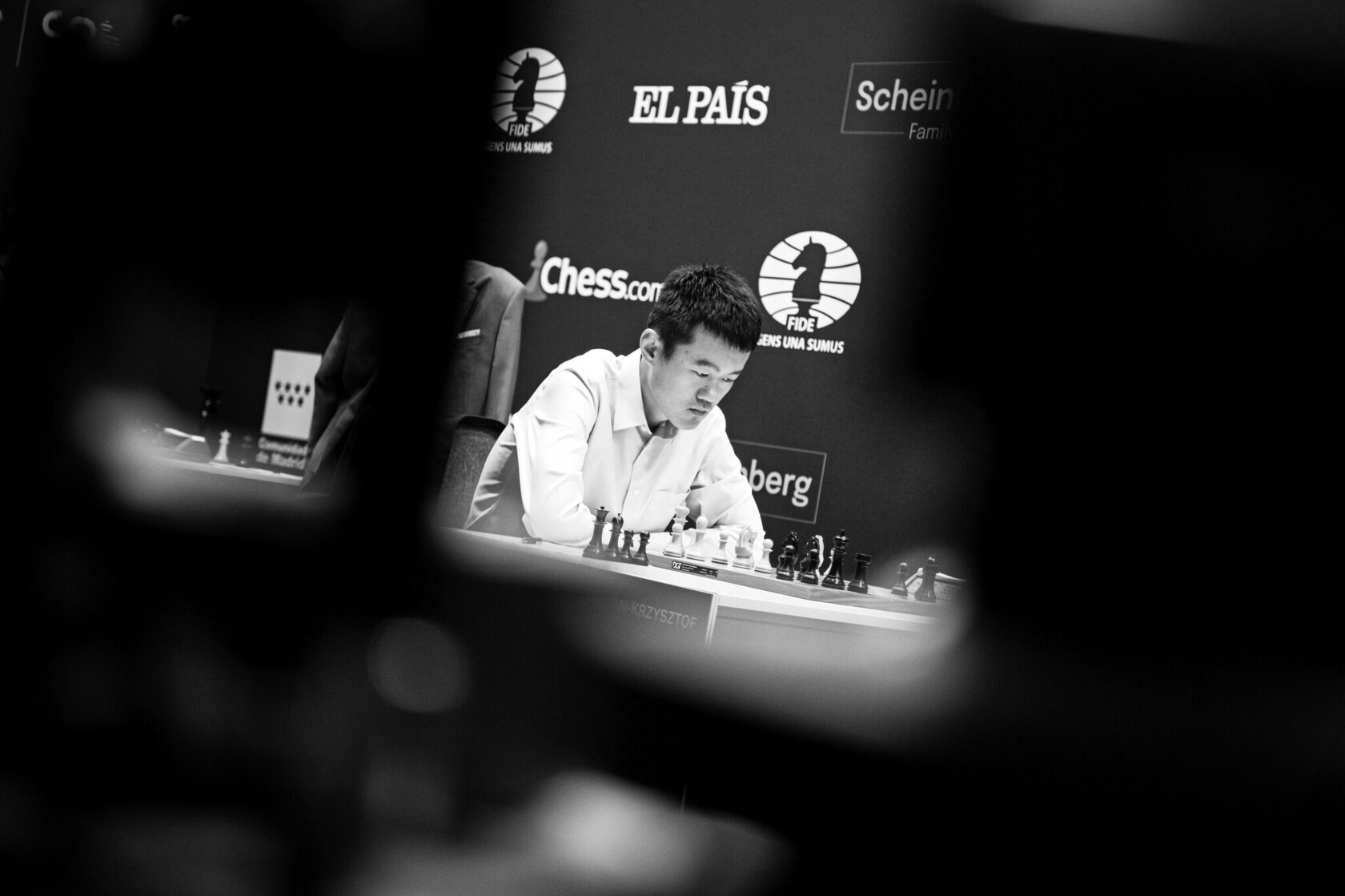
The last game of the day to finish was between Ding Liren and Jan-Krzysztof Duda. Following an even position in the neo-Catalan, White transpired into a slightly better endgame in which Duda did not demonstrate necessary accuracy. Ding managed to preserve his a-passer which eventually decided the game. To make things worse for Duda, White put his rook on c7, threatening to take the pawn on f7 and completely cut off black’s king while assisting the advance of his a-runner. Duda was struggling, but Ding was confident and, in the end, got his king to help provide support for the pawn on the a-file. With all options exhausted, Black accepted defeat after more than five hours of play.
Duda has clearly crashed and seems he cannot recover from the defeat in round six to Nepomniachtchi. In the last four games, he won just half a point. Ding, on the other hand – finally won a game and did so in a convincing fashion. With 4.5/9, he is now in the middle on 50 percent, the same as Nakamura. While it is unlikely he will manage to achieve much in this tournament, this victory could help Ding get back into his element and score some more points in the remaining five rounds.
Here follows a closer look at the games from round nine of the Candidates.
Alireza Firouzja vs Richard Rapport: The spell is broken
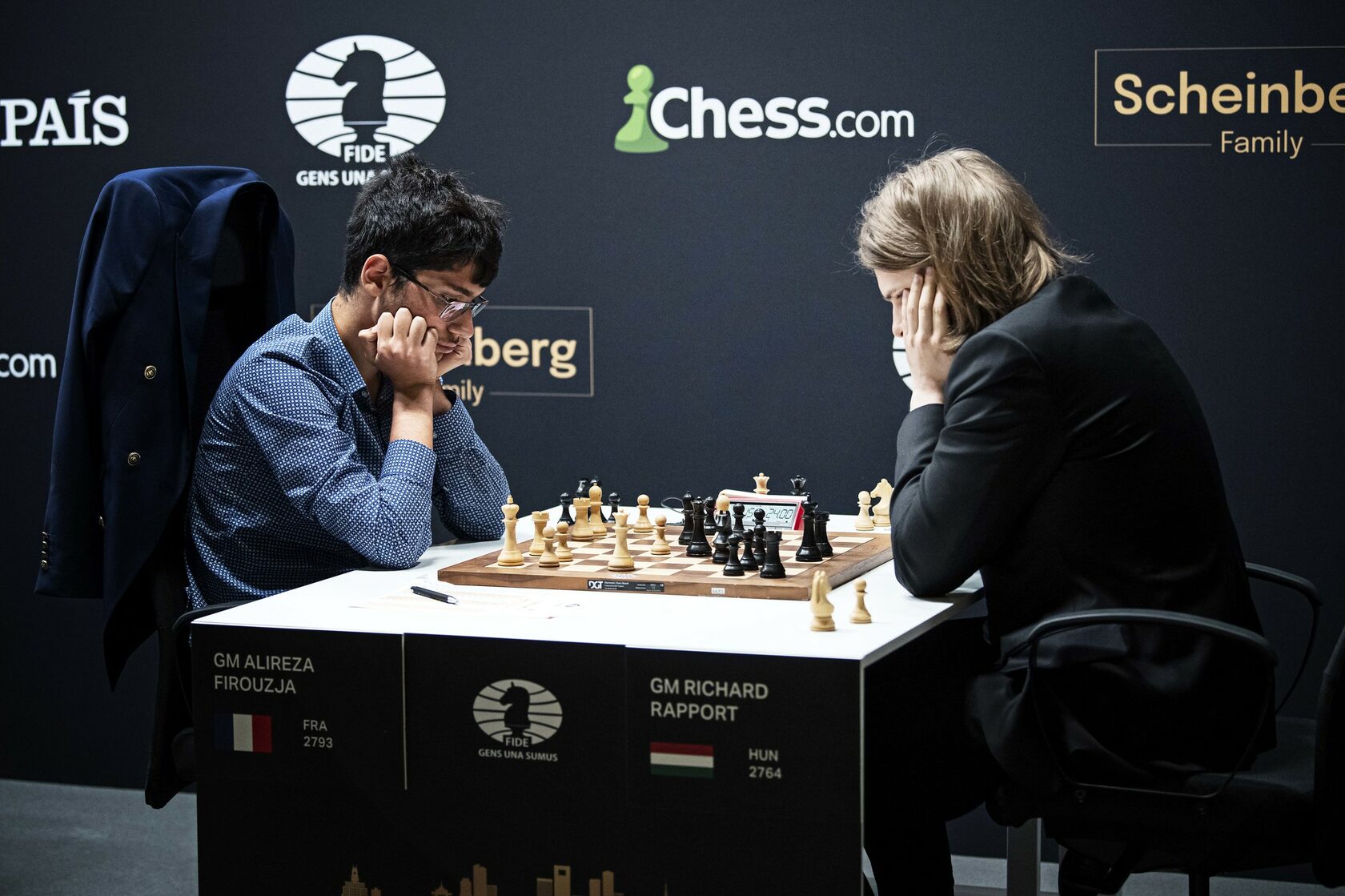
Rapport tested the Berlin defence against Firouzja and as early as move five Alireza started spending considerable time – an ominous sign based on the previous games. However, after 5.0-0 Black responded by putting a knight on d4 and going for the exchange and soon after the position was even.
Despite burning time on the clock, Firouzja was happy with the outcome of the opening. ‘I was fortunate he did not remember the line exactly. If he plays correctly, I don't get these sharp positions,’ Firouzja shared after the game in a quick post-mortem in the Chess.com studio, pointing to 10... Qe7 as the first inaccuracy for Black.
Indeed, White got a very promising position with great attacking chances on the kingside.
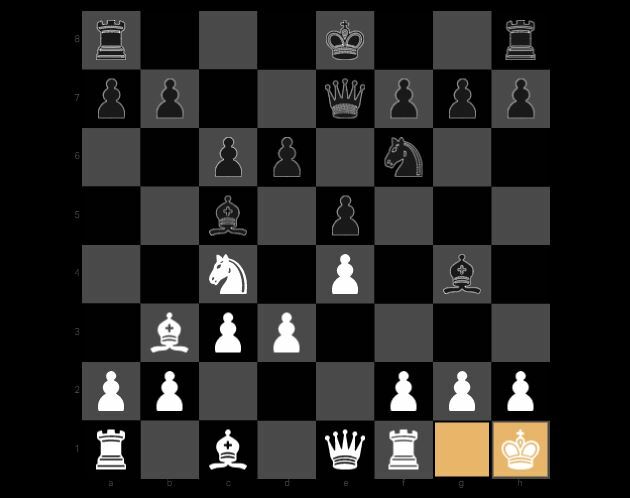
Here Rapport played 13…a5 after which White was significantly better according to the computer. For the first time in several games in this tournament, Firouzja was the one better on time.
It was clear that White got something more from the opening: he had the initiative in the centre and had greater chances to organise an attack on Black whose pieces were in each other’s way. A sharp position transpired – White was pushing on the kingside, Black was forcing on the queenside.
Firouzja somewhat prematurely forced exchanges in the centre and ended in a position where White was a pawn down but had the initiative while at the same time Black’s king was uncastled and his queen was exposed.
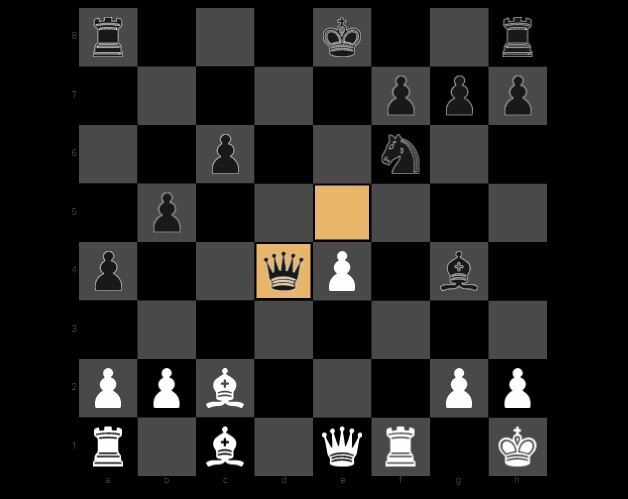
Firouzja played 20.Be3 letting his advantage slip away. 20.Bd2 with the idea of Bc3 was much more dangerous for Black. After 20…Qxb2 21.Qf2 Be6 White got compensation for two pawns, but hardly more.
A couple of more inaccuracies by Firouzja followed. By move 26, the advantage turned to Black.
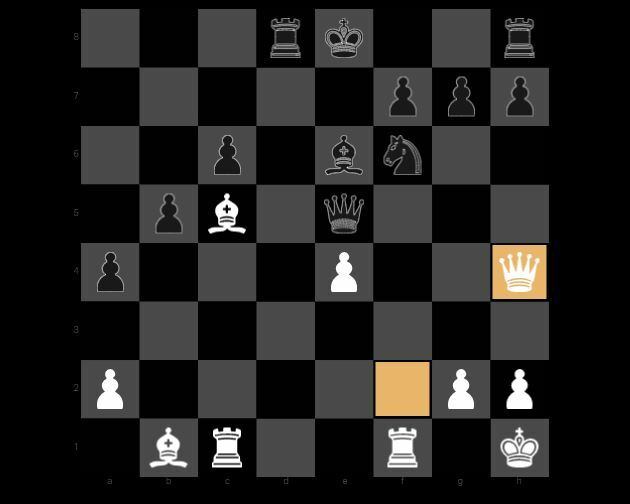
Here, however, Rapport made a big mistake. His best options were an aggressive 26…g5 or more reserved 26…Rd7. Instead, Rapport played an erroneous 26…Bc4, giving up control of the f5-square which Firouzja jumped to immediately with his rook.
Following 27.Rf5 Qb2, Firouzja played a slightly imprecise move 28.Rg1 (better was 28.Re1, pinning the centre and the uncastled king on e8). Rapport then decided to return his bishop to e6, but it was too late. Firouzja did not think twice before sacrificing an exchange by 29.Qg3 and Black’s position collapsed as he could not take the f5-rook because he would then open the e-file for a deadly attack.
Now Firouzja dominated, creating a mating net around the black king who could not move from the centre. Rapport’s attempts to relieve himself of pressure with 31…h5 only further exposed his weaknesses.
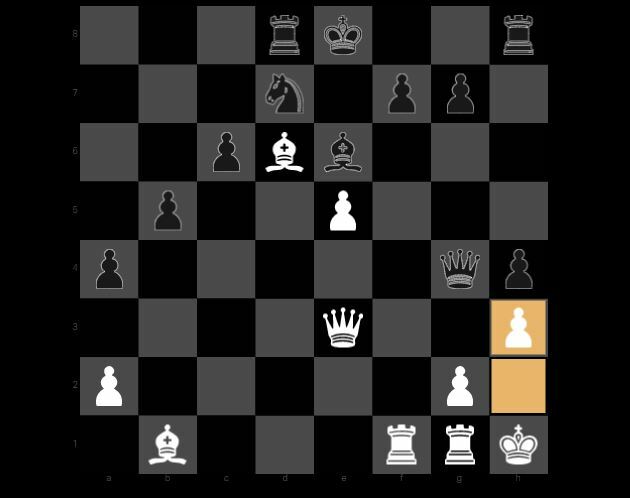
In this position, Firouzja was clearly winning. Black’s king was stuck in the centre, his rook on h8 was closed, and his queenside pawn pawns were up for grabs.
Rapport struggled for a few more moves but he couldn’t stop the inevitable: on move 41 he resigned. Firouzja has finally managed to break the spell and let his creativity roam free, and the result came immediately.
Teimour Radjabov vs Hikaru Nakamura: A long-awaited victory
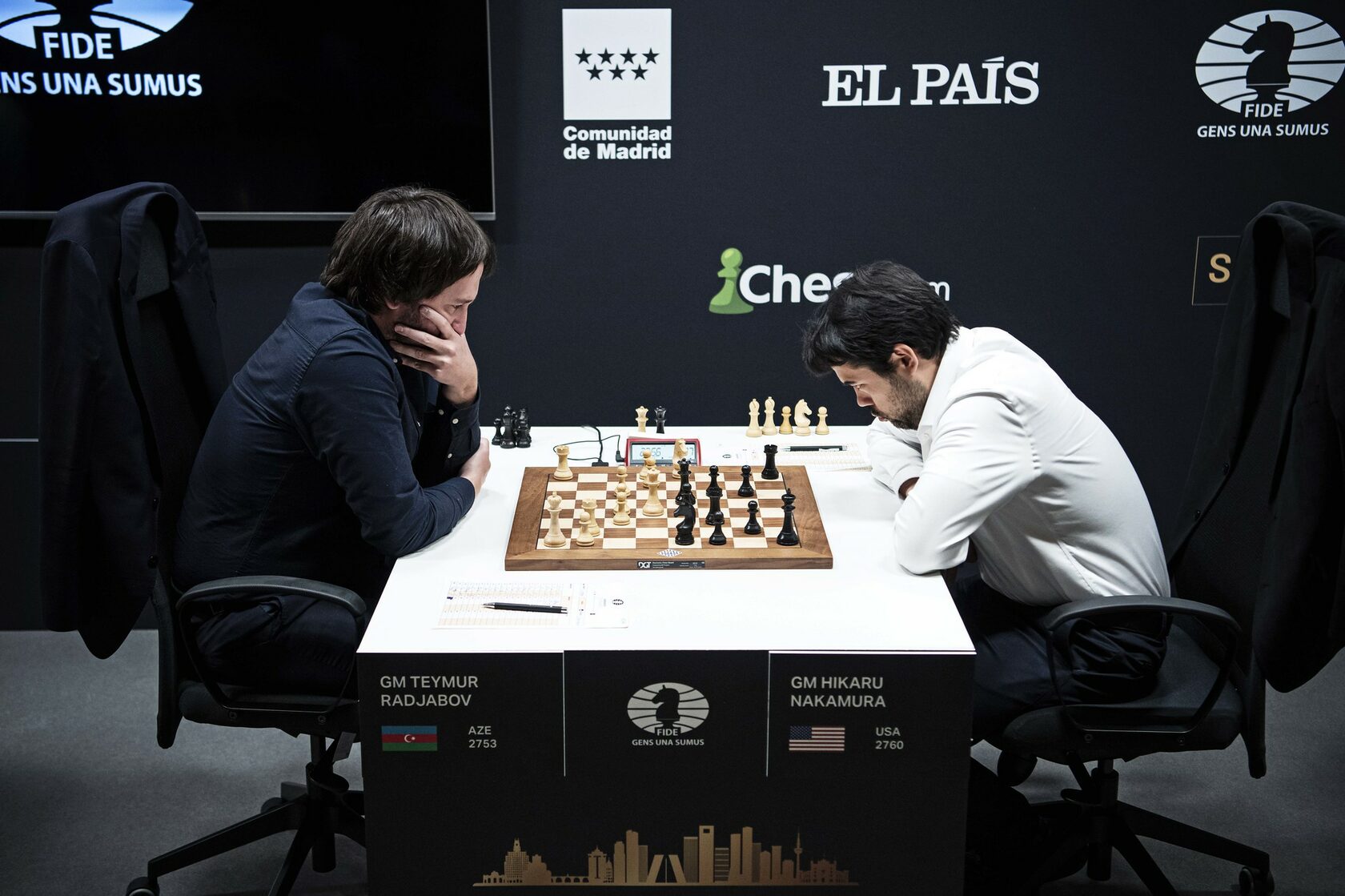

In the Berlin Declined of the Ruy Lopez, Radjabov seemed to have ambushed Nakamura who was thinking for almost a quarter of an hour as early as move nine. On moves nine and ten Nakamura actually offered a repetition, which Radjabov declined. After 13.Bb5 Nakamura decided to sacrifice a pawn by 13…Bg4, trying his luck in the complications.
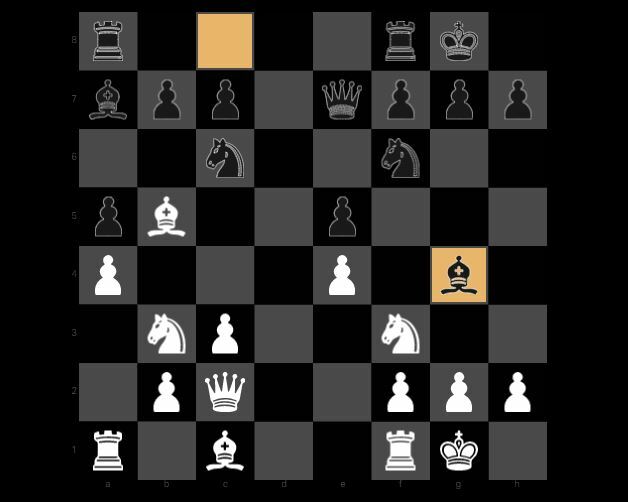
After Radjabov cooly grabbed the pawn - 14.Bxc6 Bxf3 15.gxf3 bxc6 15.Nxa5 - Nakamura sank into a long reflection. Indeed, White was clearly better: a pawn up, with better pawn structure and up on time. This was the second-best chance Radjabov had in all nine games he played so far.
In the subsequent complications, White traded some pieces, including the queens, returned an extra pawn but got a dominant position in the endgame thanks to his extremely dangerous a-passer.
Radjabov’s pawns marched unopposed towards the eighth rank. Nakamura was looking for his chances, hoping to pull off a miracle, but it was to no avail. In the following position, Nakamura resigned as White’s a7-pawn would cost Black a rook.
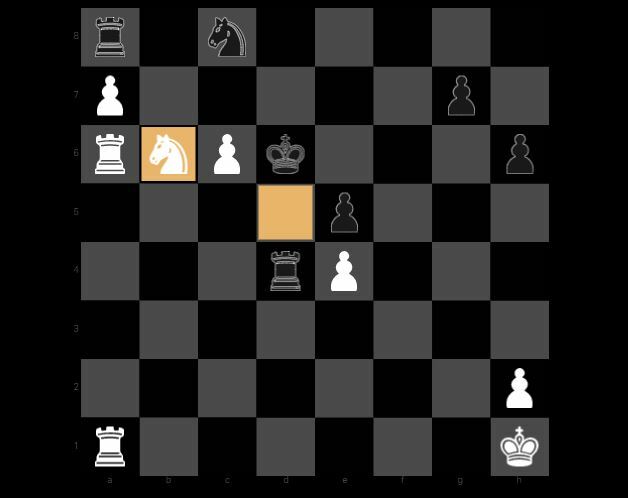
Fabiano Caruana vs Ian Nepomniachtchi: A big escape for Nepo
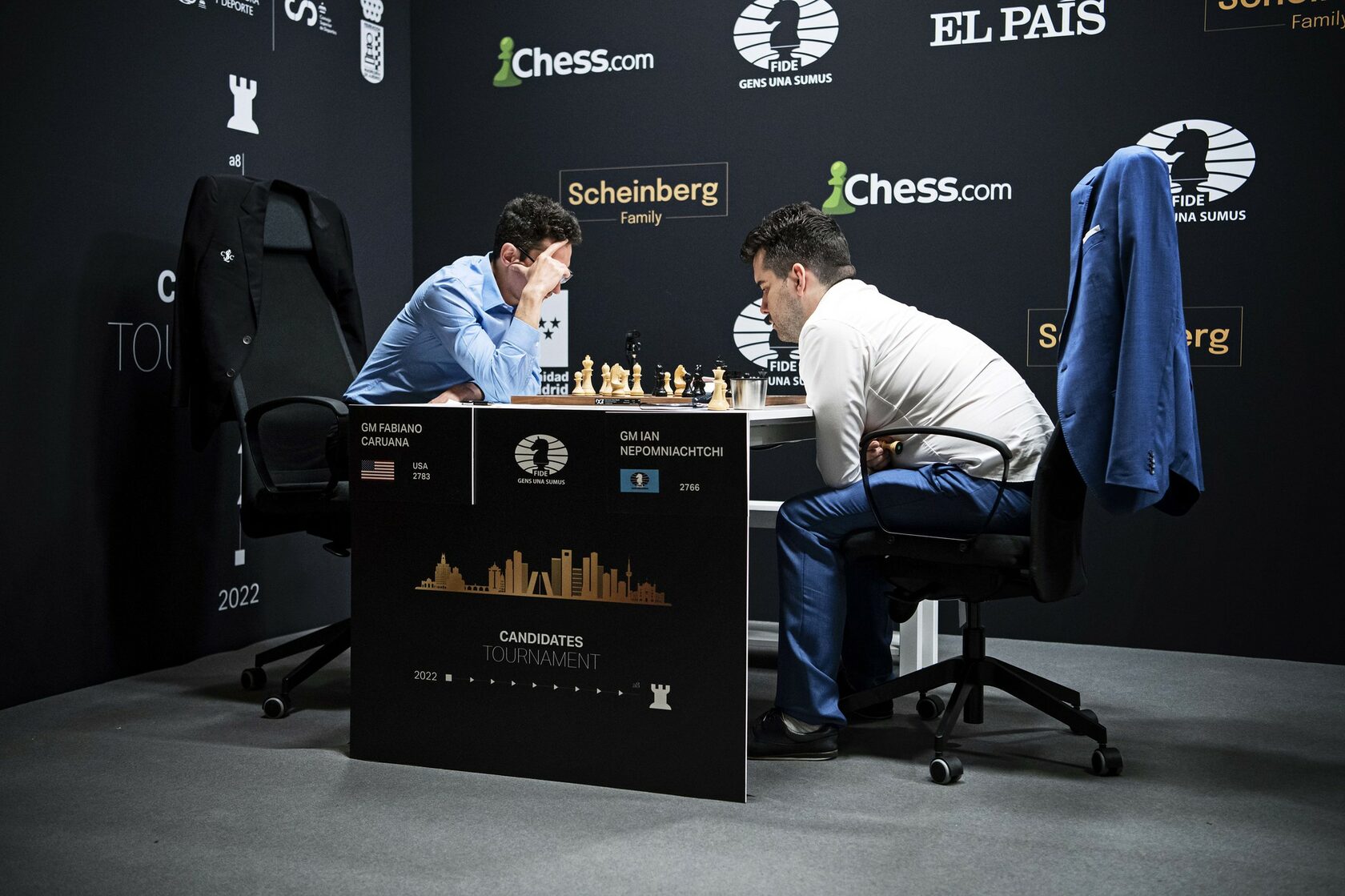
The Petrov was played – an opening both used in their championship matches against Carlsen. In the classical variation, Caruana went for a rare move 11.Nh4 (not played by GMs) which surprised Nepomiachtchi, judging by his reaction. From that point onwards Nepomniachtchi was forced to find the way in a position Caruana – renowned for his opening preparation – was well versed in.
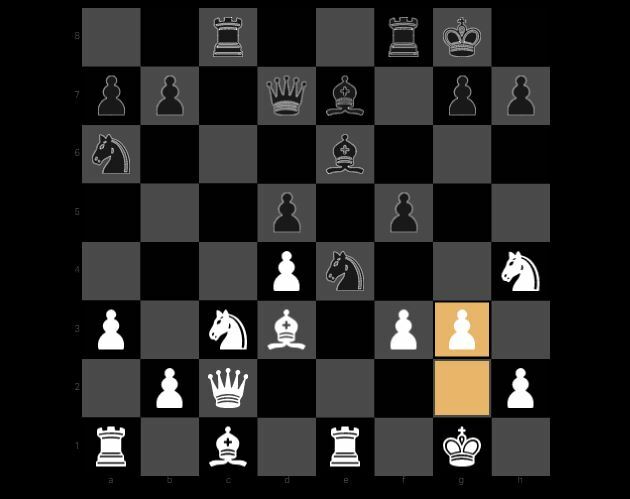
Black moved his attacked knight away - 17…Nd6. The computer almost immediately points out at 17…Bf6! with an equal position but it is virtually impossible for a human to calculate all the variations. Caruana for the first time in the game started spending more time thinking. He ended up with 18.Qa4, although 18.Qe2 seemed to have been a better choice. Nepo played 18... Bf6, allowing the exchange of queens and went for an inferior endgame but not without some counterplay.
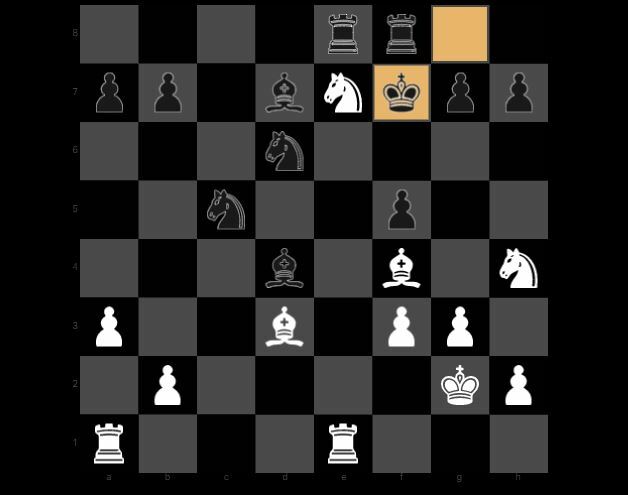
In this position, Caruana went for a series of exchanges by 24.Bxf5 after which Nepomniachtchi got breathing space for his pieces and even ended up with a runner on the b-file. Most likely Fabiano missed his best shot at this point, namely 24.Bf1! Nc8 25.Bc4+ Be6 26.Rxe6 sacrificing an exchange for a very dangerous initiative.
Nepo found a very important subtlety 27…Nd3! liquidating into a roughly equal endgame.
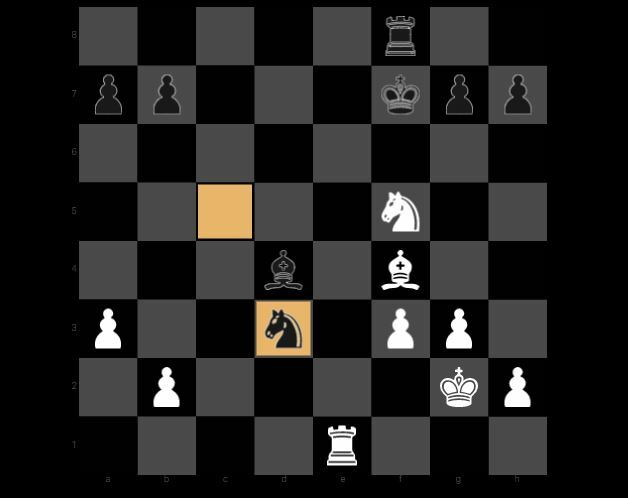
Black eventually got a passer on the b-file plus Caruana had two and a half minutes for eight critical moves to make it to the first time control. It was Fabiano now who had to be more careful. He tried to push forward but Nepomniachtchi was ready. The game ended after a perpetual check, on move 40.
A very important save for Nepomniachtchi who prevented his direct challenger for the first place to then make a big step forward. This could likely prove to be the game which sealed Nepomniachtchi’s first place in the tournament, as the only other players who seemed to have a chance of catching up – Hikaru Nakamura and Richard Rapport – ended up losing in this round.
Ding Liren vs Jan-Krzysztof Duda: Heaven and Earth
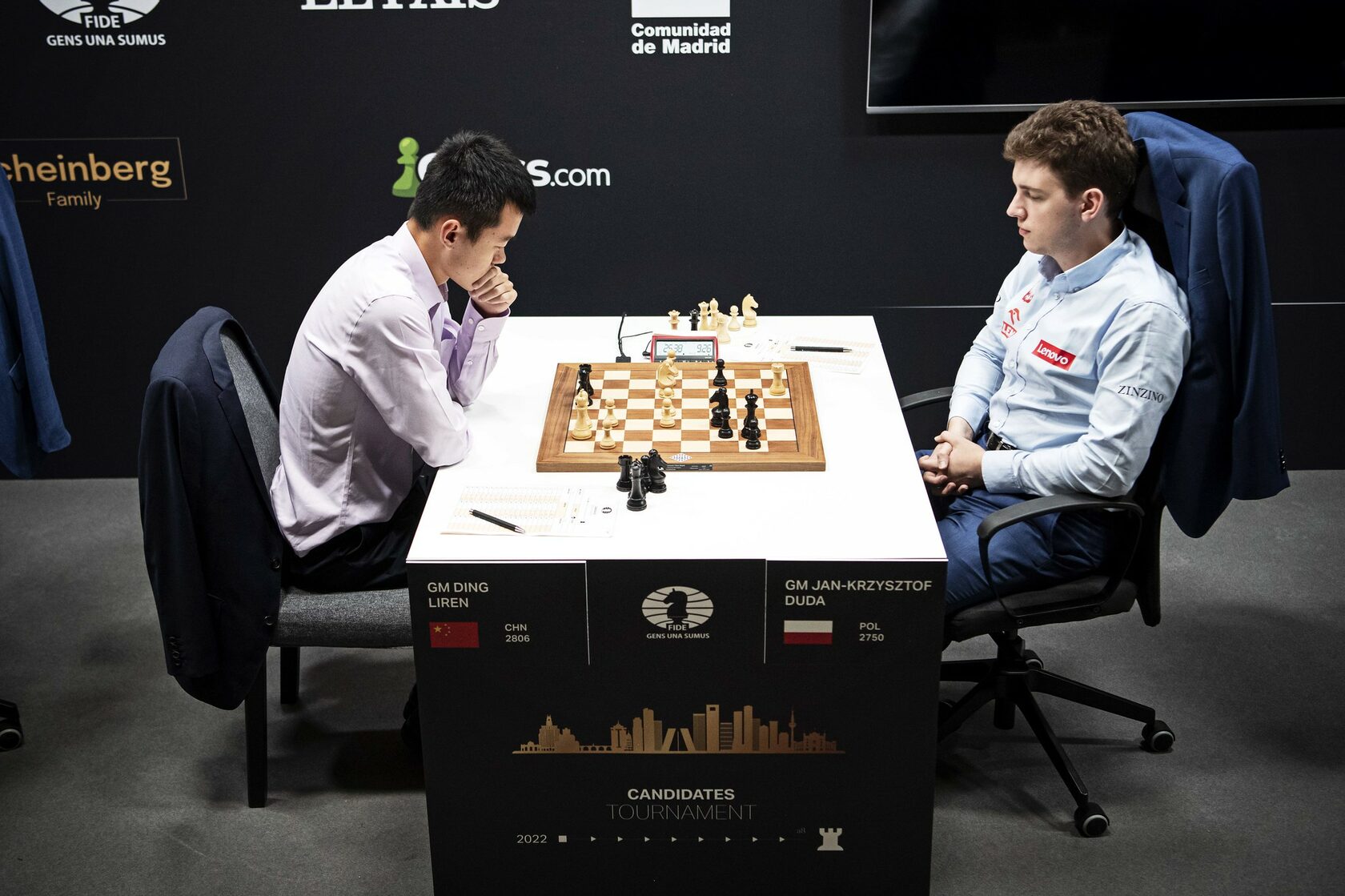
Ding opened with 1.c4 and the two transpired into the accepted variation of the neo-Catalan. Both sides castled short and finished development, with White getting a strong control of the d-file with the queen and two rooks.
Ding Liren opted for a simplified line in which the queens and several stronger pieces were exchanged, leading to an even position.
Ding continued pushing on the queenside, aiming for Black’s weak pawns there but Duda defended resourcefully and held his ground up to some point.
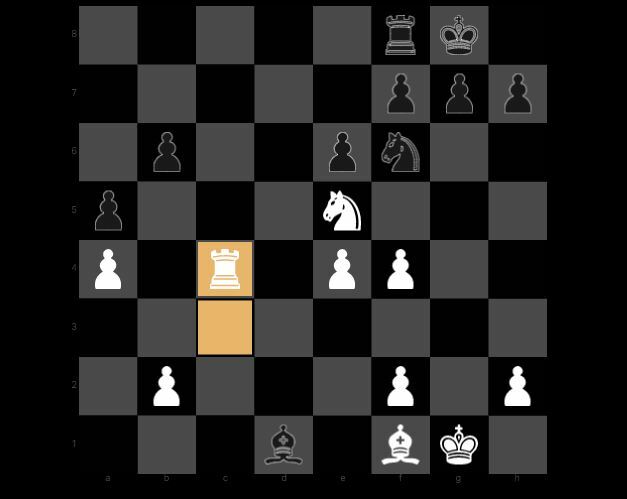
The Polish GM could have maintained equality with 28…Bb3 but he preferred a more active 28…Rd8 which was an interesting option. At some point, Duda ended two pawns down but got a dangerous counterplay against White’s king.
Ding had to return one of the pawns, pinning his hopes on the a-passer. The position was still close to even as Black had his pieces well-positioned. Instead of restoring material equilibrium Duda made a seemingly active move and ended up in an unpleasant position.
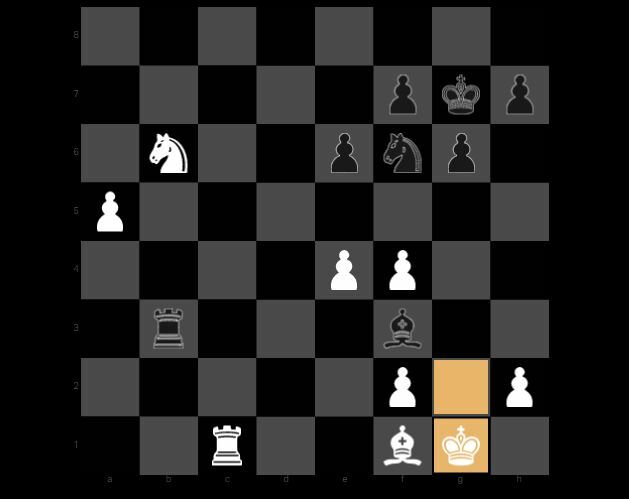
After a simple 38…Bxe4 Black is OK, but Duda opted for a seemingly more active 38…Ra3 but it failed to 39.Nc4! followed by 40.Ne5 and White went for the f7-pawn. Duda immediately entered a lost position.
Ding still had to be careful but he played precisely and did not allow the victory to slip away, as he did with good chances in other games. After trading the knights, he gradually pushed his king towards the a-file, to help assist in the promotion of the queen. After five hours, Duda resigned.
Ding Liren must feel relieved having finally won a game. On the other hand, Duda, after a good performance in the first five rounds, can’t seem to be able to make another liftoff.
Tuesday the 28th of June is a rest day. Round ten of the Candidates starts on Wednesday the 29th of June at 3 PM CEST at the Palacio de Santona in Madrid.
The pairings of round ten are as follows:
Richard Rapport vs Ding Liren
Jan-Krzysztof Duda vs Fabiano Caruana
Ian Nepomniachtchi vs Teimour Radjabov
Hikaru Nakamura vs Alireza Firouzja
